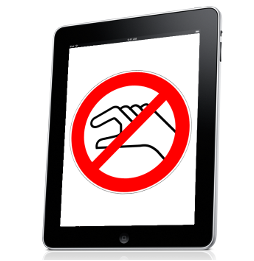
Be careful touching the iPad
Jacob Nielsen (of Nielsen Norman Group) published research about the usability of the Apple ipad with early iPad Apps and some websites. Surprisingly it is signaled that some issues encountered with websites in the early 90’s are reoccurring now with this state of the art piece of technology.
Remarkably the touch pad functionality, which would be one of the fundamental features of the device, causes the main issues. Many of the different App user interfaces seem inconsistent, causing repeated and longer learning curves for users new to specific apps and possibly the whole device in total. Here is a quote from the 97 page PDF document:
iPad UIs suffer under a triple threat that causes significant user confusion:
• Low discoverability: The UI is mostly hidden within the etched-glass aesthetic without perceived affordances.
• Low memorability: Gestures are inherently ephemeral and difficult to learn when they’re not employed consistently across apps; wider reliance on generic commands would help.
• Accidental activation: This occurs when users touch things by mistake or make a gesture that unexpectedly initiates a feature.
It’s a shame, and surprising, that Apple (well known for usability of it’s products) did not think this through. The first two issues could be solved by providing user interface guidelines to App developers, like Microsoft does for all it’s platforms. However, especially the last finding could have been anticipated and something very similar has been warned for already in 1979 by the famous, and my favorite, sci-fi writer Douglas Adams in “The Hitchhiker’s Guide to the Galaxy”:
For years radios had been operated by means of pressing buttons and turning dials; then as the technology became more sophisticated the controls were made touch-sensitive – you merely had to brush the panels with your fingers; now all you had to do was wave your hand in the general direction of the components and hope. It saved a lot of muscular expenditure of course, but meant that you had to sit infuriatingly still if you wanted to keep listening to the same programme.